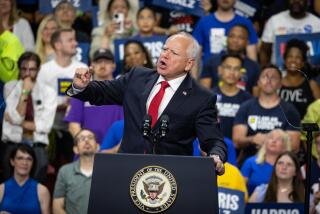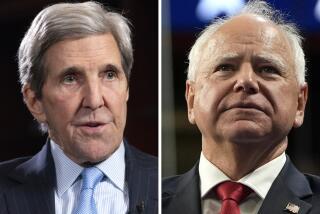The battle for veterans’ votes
Veterans could play a key role in deciding whether Mitt Romney or Barack Obama is in the White House next year. The swing states — Florida, Virginia, North Carolina, Nevada, Colorado and Ohio — have high concentrations of vets. And veterans as a group are twice as likely to vote as the rest of the electorate. No surprise, then, that both candidates are heavily courting their votes.
Veterans have traditionally favored Republicans. In 2008, Sen. John McCain won the overall veterans vote 55% to 45%, and George W. Bush had a 16-point margin over John Kerry in 2004. Polling suggests that Romney has an edge this year too, but the race for the veteran vote is not over. The cohort is more youthful — with more than 2 million troops newly returned from Iraq and Afghanistan — and their party loyalty is far from settled. Some 40% of new veterans are registered as independents, with the remainder evenly split between the parties. Moreover, for the first time in 80 years, none of the four candidates for president and vice president has served in the military.
A few key issues are likely to influence the vote. These include the prevalence of joblessness, homelessness, post-traumatic stress disorder and suicide among veterans, the chronic backlog of benefit claims at the Department of Veterans Affairs, the implementation of the post-9/11 GI Bill for education, the difficulties facing women in the military and the national security and defense budget.
COMMENTARY AND ANALYSIS: Obama vs. Romney
Despite the GOP’s advantage in the polls, President Obama has some strengths that could attract the veterans vote. He is generally acknowledged to have made veterans a top priority of his first term. He appointed retired four-star Army Gen. Eric K. Shinseki to be VA secretary, the highest-ranking military official ever to serve in this position. He increased the VA budget by 25%, funding substantial increases in mental healthcare and expanding VA medical coverage to more National Guard, reservists and other vets who had been pruned from the rolls during the Bush era. The VA implemented the post-9/11 GI bill with relatively few glitches, which has enabled 800,000 new veterans and family members to attend college.
Shinseki has set a new tone at the VA, making it easier for veterans to claim benefits for mental health issues and for exposure to chemicals in Vietnam and the Persian Gulf War. Homelessness among veterans has been cut in half. Using his military seniority, Shinseki was able to persuade the Defense Department to begin consolidating medical records with the VA — still a work in progress, but it reversed decades of infighting between the two government bureaucracies.
Obama has introduced tax credits for businesses that hire unemployed vets, strengthened hiring preferences for vets in the federal government and partnered with the private sector to host job fairs around the country. Jill Biden and Michelle Obama have actively pushed the “Joining Forces” initiative, which has increased visibility on the challenges faced by military families.
ELECTION 2012: The central issues
For many veterans, however, those things aren’t enough. They’re skeptical about Obama’s proposed defense cuts, and they are extremely worried about jobs. Unemployment among Iraq and Afghanistan-era veterans is still around 10%, after hovering at more than 12% throughout 2011. For women veterans the picture is especially bleak, with nearly 20% unable to find work. Veterans and employers report difficulty in translating military experience into civilian skills. (As one veteran explained to me: “They say — this guy drove a tank and we don’t have a tank here so this person is not qualified to work here.”) The administration’s tax credits have not worked as well as hoped because many businesses are too small to use them. And the new GI Bill is under attack in some quarters because of a loophole that has given unfair advantages to for-profit schools.
Romney is pinning his hopes on older veterans, for whom the size of the defense budget is a defining issue. The prospect of cuts in the size of the Army or reducing the number of Navy carriers worries this group of veterans.
The consensus in Washington today, reflected in the bipartisan Simpson-Bowles recommendations, is that the Pentagon will need to become leaner over the next decade. But Romney has pledged to add 100,000 more troops, build more military weapons, forgo military cuts and peg defense spending at a minimum of 4% of GDP. In doing so, he has staked out a core position on military spending that sets him apart from the president and much of the Washington establishment.
Romney does have some negatives, however, that don’t play well with veterans. He was criticized for not mentioning veterans during his acceptance speech at the Republican convention. And he hasn’t been helped by the Republicans in Congress, who in September blocked passage of the Veterans Jobs Corps Act, a bill that would have hired thousands of veterans as police officers, firefighters and first responders. Younger veterans were furious. “The Congress let partisan bickering stand in the way of putting thousands of America’s heroes back to work,” said Paul Rieckhoff, founder of the bipartisan Iraq and Afghanistan Veterans of America.
These topics will be at the top of the agenda in coming weeks, and veterans should use their electoral power to demand that the candidates be very specific about how they will use the next four years to benefit those who have served our nation.
Linda J. Bilmes is a professor at Harvard University and a former assistant secretary of Commerce under President Clinton. She serves on the U.S. Department of Labor Advisory Committee on Veterans Employment and Training.
More to Read
A cure for the common opinion
Get thought-provoking perspectives with our weekly newsletter.
You may occasionally receive promotional content from the Los Angeles Times.










